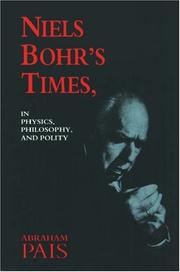Book
Abstract | Keywords | Export | Availability | Bookmark
 Loading...
Loading...Choose an application
- Reference Manager
- EndNote
- RefWorks (Direct export to RefWorks)
Book
Year: 1955 Publisher: London : Pergamon Press,
Abstract | Keywords | Export | Availability | Bookmark
 Loading...
Loading...Choose an application
- Reference Manager
- EndNote
- RefWorks (Direct export to RefWorks)
Physics --- Physique --- Bohr, Niels,
Book
Year: 1918 Publisher: Haarlem : De Erven Loosjes,
Abstract | Keywords | Export | Availability | Bookmark
 Loading...
Loading...Choose an application
- Reference Manager
- EndNote
- RefWorks (Direct export to RefWorks)
Book
ISBN: 0444869778 Year: 1985 Publisher: Amsterdam North-Holland
Abstract | Keywords | Export | Availability | Bookmark
 Loading...
Loading...Choose an application
- Reference Manager
- EndNote
- RefWorks (Direct export to RefWorks)
Book
ISBN: 9781350109032 9781350035119 9781350035126 9781350035133 Year: 2019 Publisher: London : Bloomsbury Academic,
Abstract | Keywords | Export | Availability | Bookmark
 Loading...
Loading...Choose an application
- Reference Manager
- EndNote
- RefWorks (Direct export to RefWorks)
Physics --- Physique --- Philosophy. --- Philosophie. --- Bohr, Niels, --- Bohr, Niels
Book
Year: 1955 Publisher: Oxford: Pergamon,
Abstract | Keywords | Export | Availability | Bookmark
 Loading...
Loading...Choose an application
- Reference Manager
- EndNote
- RefWorks (Direct export to RefWorks)
Book
Year: 1955 Publisher: London : McGraw-Hill,
Abstract | Keywords | Export | Availability | Bookmark
 Loading...
Loading...Choose an application
- Reference Manager
- EndNote
- RefWorks (Direct export to RefWorks)
Book
ISBN: 0199654980 9780199654987 Year: 2012 Publisher: Oxford Oxford University Press
Abstract | Keywords | Export | Availability | Bookmark
 Loading...
Loading...Choose an application
- Reference Manager
- EndNote
- RefWorks (Direct export to RefWorks)
This comprehensive scientific history presents for the first time a detailed and comprehensive study of the Bohr atom in all its aspects; provides a unique example of theory dynamics that will interest both historians and philosophers; takes into account the reception of the theory and the often critical voices of scientists of a conservative inclination; discusses the chemical aspects of the theory as an integral part; and pays particular attention to the tests of Bohr's theory and the anomalies it faced, thereby giving a clearer picture of its decline and the crisis that led to quantum mechanics.--Adapted from publisher description.
Atomic theory --- Atoms --- Bohr, Niels,
Book
ISBN: 0511878869 051160002X Year: 1993 Publisher: Cambridge : Cambridge University Press,
Abstract | Keywords | Export | Availability | Bookmark
 Loading...
Loading...Choose an application
- Reference Manager
- EndNote
- RefWorks (Direct export to RefWorks)
This book gives a detailed study of the development and the interpretation given to Niels Bohr's Principle of Correspondence. It also describes the role that this principle played in guiding Bohr's research over the critical period from 1920 to 1927. Quantum mechanics, developed in the 1920s and 1930s by Bohr, Heisenberg, Born, Schrödinger and Dirac, represents one of the most profound turning points in science. This theory required a wholly new kind of physics in which many of the principles, concepts and models representing reality, that had formed the basis of classical physics since Galileo and Newton, had to be abandoned. This book re-examines the birth of quantum mechanics, in particular examining the development of crucial and original insights of Niels Bohr.
Quantum theory --- History. --- Bohr, Niels,

ISBN: 0198520484 9780198520481 Year: 1993 Publisher: Oxford: Clarendon,
Abstract | Keywords | Export | Availability | Bookmark
 Loading...
Loading...Choose an application
- Reference Manager
- EndNote
- RefWorks (Direct export to RefWorks)
Abraham Pais's life of Albert Einstein was one of the finest scientific biographies ever written. When it first appeared in 1982, Christian Science Monitor called it "an extraordinary biography of an extraordinary man," and Timothy Ferris, in The New York Times Book Review, said it was "the biography of Einstein he himself would have liked best," adding that "it is a work against which future scientific biographies will be measured." As a respected physicist himself, Pais was the first biographer to give Einstein's thinking its full due, yet despite the occasional high level of science needed to discuss Einstein's ideas, the book was a national bestseller. Indeed, it was one of The New York Times's Best Books of the Year, and the winner of the 1983 American Book Award for Science. Now Pais turns to Niels Bohr, to illuminate the life and thought of another giant of 20th-century physics. Bohr was the first to understand how atoms were put together, he played a major role in shaping the theory of the atomic nucleus, he decoded the atomic spectrum of hydrogen, an achievement which marks him as the founder of the quantum dynamics of atoms, and his concept of complementarity (which provides the philosophical underpinning for quantum theory) qualifies him as one of the twentieth century's greatest philosophers. Pais covers all of these achievements with sophistication and clarity, but he also reveals the many other facets of the man. Perhaps most important, he shows that Bohr was not only a great scientist, but also a great nurturer of young scientific talent, acting as father figure extraordinaire for several generations of physicists. Bohr's Institute of Theoretical Physics, which he founded in Copenhagen and for which he tirelessly raised funds, was the world's leading center for physics all through the 1920s and 1930s, the birthplace of Heisenberg's papers on the uncertainty relations, Dirac's first paper on quantum electrodynamics, and other pivotal works. And
Nuclear physics --- History. --- Bohr, Niels Henrik David, --- Bohr, Niels --- Physique nucléaire --- Histoire --- Bohr, Niels,

 Search
Search Feedback
Feedback About UniCat
About UniCat  Help
Help News
News